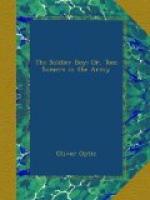The squire was too self-sufficient and opinionated to be influenced by the advice of friends or the warning of those who had suddenly become his enemies. He had so often carried the town to his own views, that, perhaps, he expected to manufacture a public sentiment in Pinchbrook that would place the town on the side of the rebels. All day Sunday, and all day Monday, he rode about the Harbor preaching treason. He tried to convince the people that the South had all the right, and the North all the wrong; but he had never found them so obstinate and incredulous before.
Towards night one of the ministers ventured to suggest to him that he was sowing the wind, and would reap the whirlwind. The good man even hinted that he had roused a storm of indignation in the town which he might find it difficult to allay.
The squire laughed at the minister, and told him he was not afraid of any thing. He intended to speak his honest sentiments, as every citizen had a right to do; and he would like to see any man, or any body of men, who would dare to meddle with him.
“I am afraid you will see them, Squire Pemberton,” added the minister.
“Let them come where they please and when they please.”
“What will you do? What is your single arm against scores of strong men?”
“Nothing, perhaps, but I don’t fear them. I am true to my convictions; why need I fear?”
“I think your convictions, as you call them, are deluding you. Do you think Benedict Arnold’s convictions, if he had any, would have saved his neck from the halter?”
“Do you mean to compare me to Benedict Arnold, sir?”
“I came to you, as a friend, to warn you of impending danger; and, as your friend, I am compelled to say that I don’t see much difference between your position and that of Benedict Arnold.”
“Do you mean to insult me?”
“Not at all, sir. I was only expressing my honest conviction. Instead of placing yourself on the side of your government, on the side of law and order, you are going about Pinchbrook Harbor denouncing the legitimate government of your country, and pleading the cause of rebels and traitors.”
“Am I not at liberty to say what I please of the government?”
“In ordinary times, you are. Just now, the country is in a state of war, and he who is not for the flag is against it. You may criticize the government as its friend, but not as its foe. When armed men conspire against the peace of the land, he who pleads their cause is a traitor—nay, sir, don’t be angry; these are my convictions.”
“Political parsons have been the ruin of the country,” sneered the squire. “That is my conviction.”
“Squire Pemberton, I beg you not to be rash. If you must cherish these pernicious views, I entreat you, keep them to yourself. You may think what you please, but the utterance of treason makes a traitor.”
“I shall proclaim my views from the housetop,” replied the squire, angrily, as he abruptly turned away from the minister.




